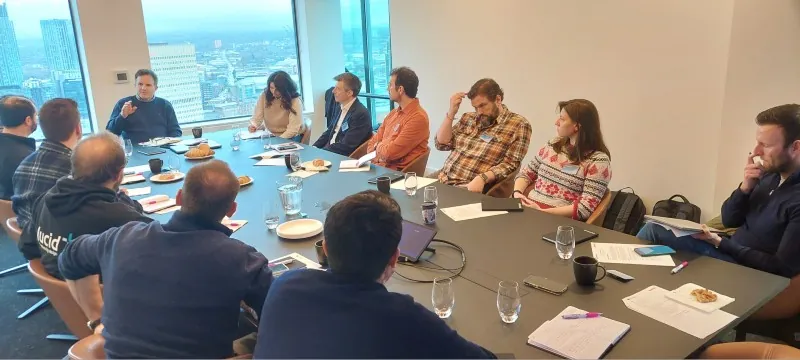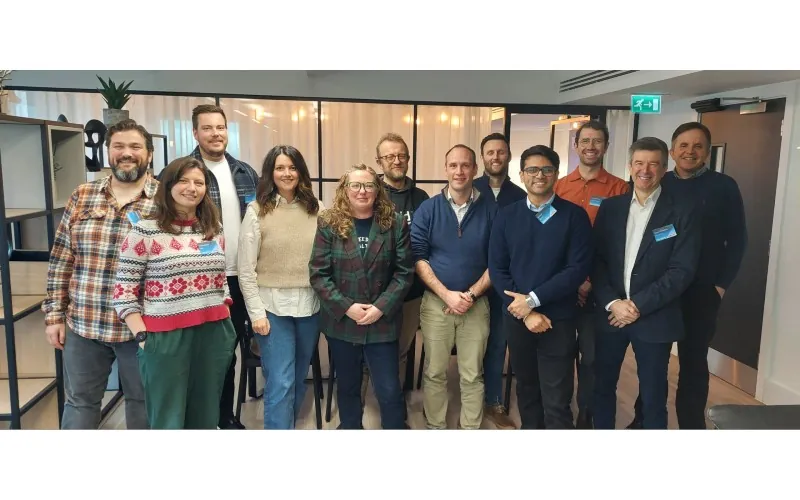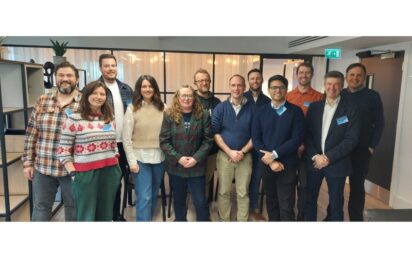Data has become the backbone of innovation in our healthcare system, fuelling advancements in patient care, diagnostics and operational efficiency.
But is it moving fast enough? And do the potential opportunities outweigh the dangers of going all-in on tech?
We partnered with Refresh to bring together entrepreneurs and key figures at technology companies working both inside and with the healthcare sector to find out.
A physical roundtable in the boardroom at City Tower in central Manchester was followed by a virtual session.
Stephen Critchlow is CEO of Salford-based Evergreen Life, behind an app which empowers people to improve their health and lifestyle by connecting them with more effective, joined-up care.
Asked whether technology can ‘save the NHS’, he counters with a question of his own: “At a fundamental level, what do we mean by ‘save’? I think we’re all confused in the NHS about which target we want to hit.
“If you use data to change the way we work, that’s exciting – but the problem is that we’re using the data to ration and use the money we’ve got most effectively. That’s what the NHS is the most likely to do [with technology].
“The way that we treat people today, there aren’t enough healthy people to treat sick people. So it’s not even a financial issue; it’s not really about money. We have to change the way we work; completely revolutionise the way we think.
“If you’ve got a mobile phone in your hand, what could you do at home to mean that you never even enter the system in the first place? Those are the kind of questions we have to be brave enough to ask.”

Patient-first
Carron Manning is co-founder at Chiron Health AI, a startup developing a breakthrough model in chronic disease management which was created within the Founders Factory venture studio. Its first product is described as the world’s first AI-powered Fibromyalgia app.
She says data is absolutely essential for making healthcare more clinically effective, personalised and precise. “Data will transform medical guidelines. Medical guidelines currently are based on the medical condition. What we’re trying to do now is move forward so that medical guidelines are based on the person,” she explains.
“We want to say: okay, you’ve got cardiovascular disease – but you’re a female, you’re 55 and you’ve got these other comorbidities, and that is going to determine how we’re going to treat you. That’s what data can do.”
Manning, a former Team GB senior physiotherapist at the UK Sports Institute, adds: “Doctors often treat what’s in front of them – say, a scan – whereas they should be asking the patient how they’re feeling. It’s really important that we never, ever lose sight of the patient and what it means to them.”
Shain Khoja is founder & CEO at Thriving.ai, a US-based startup which connects anyone needing additional support in the home such as people living with disabilities, ageing parents, families and professional caregivers through a mobile app.
“Data can be an exceptional friend and very valuable, especially when you’re looking at treating people in an integrated manner… as a person,” she says.
“As you age, it’s all about quality of life, not quantity of life. Nobody wants to live to 105 with two oxygen cylinders and a nasogastric tube. They want to enjoy the years. And we have that opportunity with data.
“There’s a purpose for regulation, which is important, but regulation shouldn’t stifle growth. It’s a balancing act – but managing our health using data points that are evidence-based and specific to our own needs is the way forward.”
Citing the book Being Mortal by Atul Gawande, she says: “The way he treated his patients was he didn’t treat the cancer. He treated what was acceptable for them. The patient sets the standard of what they need and the treatment plan is set accordingly.
“It’s an interesting way of looking at it, because you’re using the data – but you’re getting the patient’s input then treating them in a humane, compassionate way.”
Playing the percentages
Emma-Louise Fusari is founder and clinical director at Salford-based In-House Health, a startup combining technology and healthcare expertise to help organisations establish and eliminate the root cause of work-related ill health.
“There is an abundance of data in the NHS,” says the former nurse. “But do we know what data is available? Are we collecting the right data? Are we doing it safely? And are we deploying it correctly to allow healthcare professionals to improve long-term health outcomes, as well as efficiency?
“We’re a growing population. We’re an ageing population. If we don’t put the fires out and be more preventative in the next 15, 20, years, then there won’t be an NHS.
“There’s an obsession with [being concerned over] AI and emerging technologies and data. But in pharmaceuticals, when you do your clinical trials, you look at the percentages. They should be doing the same when adopting technology in the NHS, because we’re not going to get it right first time – but what if it’s 95% right? What can that achieve?”
Taz Aldawoud is CEO of Doc Abode, a real-time clinician deployment platform based in West Yorkshire that aims to safely connect a multi-disciplinary clinical workforce to NHS patient needs.
“Tech isn’t going to save the NHS, per se – it’s going to enable the NHS to save itself, because we’re just enablers in a lot of this,” is his view. “If it’s not easy to use, it won’t have an impact: you’ve got to think out all the adoption.
“But there is now a huge drive towards digital. The NHS has put its hands up and said, ‘we know we can do better’ – and tech is key to improving what has been to now an analogue approach.”
‘Growing up in wheelchair drove me to shake up the care business’
Entrepreneurial energy
James O’Loan is CEO at Chemist4u, a leading online pharmacy which delivers healthcare essentials and services online across the UK from its home in Skelmersdale, Lancashire.
“I’ll definitely say data is a friend to healthcare,” he answers on the ‘friend or foe?’ question. “The opportunity is too great.
“Everything in healthcare is risk versus benefit. Whether you’re providing medicine or a service, you have to weigh up the fact that a percentage will go wrong; provided that that percentage is within acceptable limits, you should always err on the side of the opportunity. And I think entrepreneurial energy will always drive that forward.”
One founder who is full of such energy is Sid Sethi of Bury-based Specscart, one of the UK’s fastest-growing eyewear businesses which is now huge online but also has physical stores.
“The difference between other countries and the UK is that we are not fast adapters,” says the Delhi-born entrepreneur. “When we launched our physical stores and decided to do eye tests, I said: ‘We’ll send prescriptions via email.’ And everybody said: ‘No! We can’t do that, emails are not secure.
“But letters are also not secure. You might ask what happens if the customer enters the wrong email address; but what happens if they provide the wrong home address?
“There’s a fear from practitioners that they will be less important after technology comes in, but I don’t think that’s the case.”
Cost barrier
Martin Fergie, CTO at Spotlight Pathology – a University of Manchester spinout company developing AI tech to improve diagnosis of blood cancer which recently relocated to Sci-Tech Daresbury – says healthcare in the diagnostic space has long since adopted data.
“Every new treatment or a diagnostic has to be backed up with data before it is introduced,” he explains. “The challenge is in increasing the efficiency of the collection of that data.
“The big barrier to a business like us is convincing clinicians via safety evidence, but also procurement and hospital management by demonstrating the commercial business case of technology saving money.
“The cost of collecting that data and the time to collect that data is a massive limiting factor. A big opportunity is actually the need to help the data collection process and speed up that decision making.”
Reactive
Philip White is MD of Leeds-based Audacia, a development company and technology partner for bespoke software projects whose clients include the National Institute for Health Research.
“A consistent approach to security and risk is needed,” is his view. “At the moment, it just yo-yos everywhere: if you look at how things go through R&D into pilot, there’s all this weight behind it, all this excitement, and it starts to empower frontline people.
“But then you might see a hiccup around the outcome of an R&D project, or the security of data, and rather than shaping the strategy, the next stage is ‘bin it’. We need a less reactive strategy.
“Most security strategies are also reactive rather than proactive: ‘We’ve been hacked so now we need to upgrade our security policy.’”
He adds: “Data is a friend, if managed properly – but it’s just a commodity. The big change that’s got to happen is the culture around the people that are using the data; a shift in how they think about data.”
Alistair Williamson is MD of Lucid Group, a global healthcare consultancy which creates, prototypes and delivers innovative products and digital interactions.
Referencing the rise of AI, he says: “When we’re developing products which largely go into the NHS, I meet lots of healthcare professionals who have actual intelligence – and that actual intelligence can be be great for managing artificial intelligence.
“My hope for the future is that these people – doctors, nurses, clinicals and professionals – will be in charge of the adoption and prevent the use of data from becoming artificial and disconnected.”
Cassie Watson is head of product at Manchester-based Deploi, which is aiming to build a safer and more efficient frontline workforce through AI-driven background checking and onboarding solutions.
“Is the potential of the optimisation that this data collection and processing can give worth the trade-off of the risk and security concerns that comes with it?” she considers.
“The keenness [around this table] to be proactive and solve these problems before they even start tells me that absolutely, data is a friend – and we need to have a less risk-averse approach to embedding it in our systems, our processes, our day-to-day, because there is no progress without balancing that risk.”
Social care reform
Phil Neilson’s business AVERio alerts care workers and family members to changes in a person’s activity or incidents, such as a fall.
“We need to surface data in the right way and support people to adopt it so it becomes their friend,” he says. “I spent 15 years or so on the other side of the fence before starting AVERio trying to support people in social care through technology.
“It was difficult, because change is hard in social care: it’s a bit different in healthcare, but still a challenge. We need to help data to be a friend of those people, and we need to do that by supporting them through adoption.”
The UK government is pledging to drive through social care reform via an independent commission chaired by Baroness Louise Casey which will begin work in April, but is not due to publish its final report until 2028.
Health Secretary Wes Streeting defended the timescale on the basis that the aim was to change the model of how social care is delivered. Technology will play a crucial role in how people are cared for in their homes as well as the sharing of medical information.
Speaking before the recent announcement, Neilson said: “Social care is a massive part of the NHS that very rarely gets talked about.
“Doing things differently in social care will make a massive difference to health, to the NHS and to healthcare in general. There’s a big old gap there where the technology is not adopted, not supported, and not as enthusiastic as it is for the NHS.”
Using data in storytelling
Doc Abode’s Aldawoud says telling the story around potential benefits is key to driving data innovation into healthcare.
“You’ve got to target your story, depending on who you’re talking to. The system leaders need to pitch it the right way,” he says.
“The NHS will always find a reason to say no – they are risk-averse, or even change-averse, really. Absolutely, tech has got massive potential; but I think it’s about how we articulate the story.”
Lucy Moore, director of strategy and partnerships at Refresh, a creative-led PR and marketing partner to brands, agrees with that sentiment.
“You can absolutely use data to help craft a narrative demonstrating how what you’re doing is really helping people and having tangible benefits,” she says.
Rick Hollister, associate director at Manchester-based Refresh, says “it’s about sharing the right data to the right audiences”.
“Are you communicating to a VC audience if you want to raise funds; or get into the NHS; or, on the customer acquisition side, target a consumer audience with much simpler data and messaging?
“Making sure you don’t lose sight of the human touch is also really important.”
Moore adds: “On the other side, with the increased amount of data coming through, there will always be a risk of breaches – so from a communications perspective, organisations should be looking at their strategy in the event of a data breach.
“It’s a lot easier to manage this proactively than reactively after the fact. Look at your stakeholders and decide: who do we need to communicate with? In what order? And what are the messages?”


